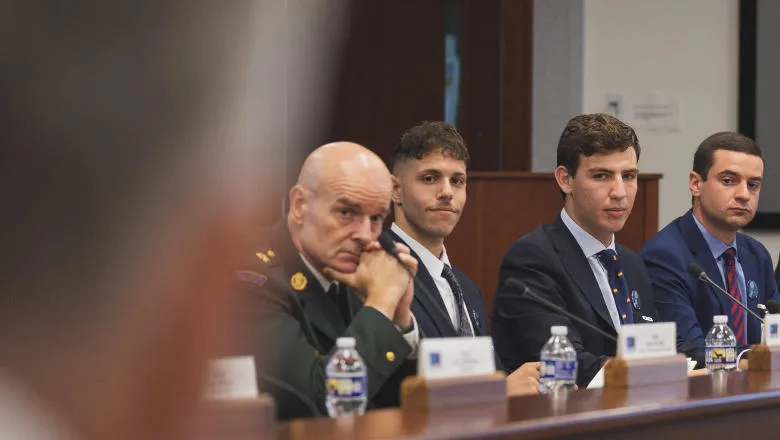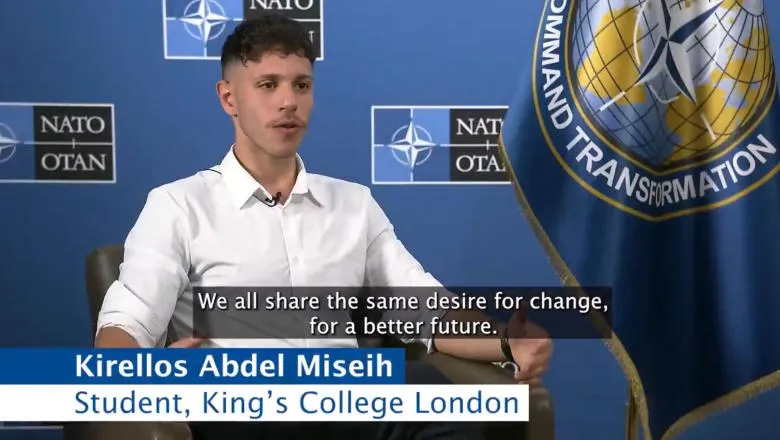"This prestigious recognition not only brings personal satisfaction but also validates my work exploring the emerging issue of neurotechnologies and their impact on security. In addition, learning first-hand how NATO continually strives to adapt to a rapidly evolving world - for example, by addressing emerging technologies and giving voice to the youth - was fascinating and confirmed to me that NATO's leadership is indeed extremely competent, dedicated, and forward-looking"
Kirellos Miseih
26 June 2023
War Studies student wins NATO challenge by tackling the security risks of neurotechnologies
MA International Conflicts Studies student Kirellos Miseih was one of the three winners of the NATO ACT 20th Anniversary Student Challenge, which invited students to address how emerging and disruptive technologies will impact the transformation of NATO.

Kirellos Miseih presented a policy paper on the security implications of neurotechnologies, a growing area of biological science that focuses on establishing a direct connection between the human nervous system and technology. This includes Brain-Computer Interfaces (BCIs), which enable direct communication between the brain and an external device.
Dr Filippa Lentzos, personal tutor of Kirello Miseih, emphasised the competitive nature of the challenge and highlighted that his success also speaks to the high calibre of King’s student body more generally.
"I am immensely proud of him. Kirellos' project focuses on neurotechnologies—a rapidly growing area of the biological sciences with significant security implications. His winning policy paper entry considered how the Alliance might embrace the opportunities and risks of these potentially disruptive technologies, and it is something we're exploring together in his dissertation research"
Dr Filippa Lentzos
BCIs have provided a myriad of benefits to individuals with severe motor disabilities, for instance, enabling the control of prosthetic limbs with the brain. However, as this technology advances and unfolds new opportunities—from virtual gaming and home control systems to military communication—it also has critical implications for democracy and security.
“While neurotechnologies fuel progress in many different ways, they rely on the collection and processing of sensitive data and as such, pose important information security issues. There is the risk of hackings, data breaches or, in general, improper use of data...Brain-computer interfaces significantly expand and deepen the extent of personal data that can be collated and, thus, wrongfully exploited”
Kirellos Miseih
To tackle this issue, Kirellos’ policy proposal focused on three pillars: encouraging further research and collaboration with academic and research institutions in neurotechnology; reinforcing partnerships with the private sector; and developing in a timely and collaborative manner a regulatory framework that encourages innovation and safeguards privacy and information security.
"Notwithstanding, all the present unknowns are exactly why we need to pay more attention to the world of neurotechnology now. To effectively anticipate and mitigate the risks stemming from emerging and disruptive technologies and maintain and sharpen NATO's technological edge, it is critical to address neurotechnology's accelerating proliferation. The golden triangle of business, government and academia is a holistic approach that does not threaten innovation or stop the progress of this life-changing technology. It cherishes innovation and offers a way to do so ethically, and in line with the very values of individual liberty, democracy, human rights, and the rule of law, that NATO protects"
Kirellos Miseih
Regarding the measures that NATO should implement to address privacy and information security issues, Kirellos Miseih says it is necessary to provide guidance, set standards, and raise awareness among all the stakeholders, including developers, researchers, regulatory agencies, and end-users. For him, the legislation "should not be merely reactive and restrictive, but proactive, forward-looking, and dynamic".
Watch an interview with the award winners here.


